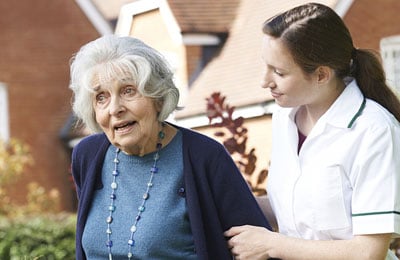 When it comes to senior care, the more you know the better care you can provide. This is very true when it comes to bedsores. Did you know that there is more than one way to get a bedsore? While most people think of bedsores as only affecting seniors who are completely bedridden, there are a variety of other conditions that may lead to the development of bedsores.
When it comes to senior care, the more you know the better care you can provide. This is very true when it comes to bedsores. Did you know that there is more than one way to get a bedsore? While most people think of bedsores as only affecting seniors who are completely bedridden, there are a variety of other conditions that may lead to the development of bedsores.Since it is much easier to prevent a bedsore than to heal it after it forms, it is important to learn about the risk factors, causes, and treatment of bedsores before they become a serious problem for your loved one.
What Bedsores Are
The Mayo Clinic explains: "Bedsores, also called pressure sores or pressure ulcers, are injuries to skin and underlying tissue resulting from prolonged pressure on the skin. Bedsores most often develop on skin that covers bony areas of the body, such as the heels, ankles, hips and tailbone."
Bedsores can affect people of any age, but the elderly are more prone to bedsores than other age groups. This is because the skin of older adults is more fragile and drier than the skin of younger people. Also, since seniors produce new skin cells more slowly than young people do, their skin is more vulnerable to damage.
Risk Factors for Developing Bedsores
In addition to advanced age, there are some other common factors that contribute to the development of bedsores. For instance, mobility issues are the primary risk factor. Your loved one is at risk for developing bedsores if he or she is bedridden or wheelchair-bound.
Even if your loved one has some degree of mobility, bedsores can develop if he or she sits for long periods of time in the same chair and same position. Since there is a tendency for some seniors to become more sedentary as they age, this is of concern.
Other risk factors for developing bedsores include:
- Improper nutrition
- Poor circulations
- Lack of sensory perception
- Effects of a stroke
- Weight loss
- Dehydration
- Incontinence
- Diabetes or vascular disease
- Smoking
- Lack of mental acuity
How to Prevent Bedsores Before They Become a Problem
The article "Caring for Elderly Pressure Sores" gives the following tips for helping your loved ones prevent bedsores:
Keep skin dry and clean: Moisture from sweating or from incontinence can cause sores to develop more quickly. Keep your loved one cool and dry by promptly cleaning up any accidents and patting the area dry rather than rubbing the skin with a towel. Dress your loved one in breathable fabrics like cotton and avoid using synthetic sheets that may hold in moisture.
Change your loved one's position: It is recommended that you move your loved one every two hours or so. If your senior has limited mobility, minor moves can be effective if done correctly. Do not drag your loved one across the bed, as this can tear fragile skin and allow sores to develop. Rather, simply turn or lift your senior if possible.
Use pillows and pressure pads: Remember that bedsores often develop on bony surfaces. Keep your loved one's ankles and knees from lying against each other in bed by gently placing thin pillows or pressure pads between bony areas.

Getting Professional Senior Care
If you see a bedsore developing, seek medical help immediately. The more quickly you address the situation, the more likely it is that you can halt the progression of the sore and help it heal. Your loved one's physician or wound care nurse can help you learn what to do to care for the sore until it heals properly.
Additionally, a home care worker can do much to help you prevent and treat bedsores. A home care worker can encourage your senior to work on any mobility issues, ensuring that your loved one is as mobile as possible.
Home care workers can also help you to keep an eye on your loved one's skin condition to spot any trouble before it escalates. In addition, home care workers can encourage your loved one to stay hydrated and to maintain a proper diet, thereby helping skin to stay healthy.
If your loved one is at risk for developing bedsores, contact us today to discuss what our home care workers can do to help.


